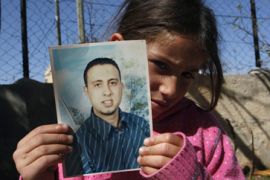Arab unity before peace with Israel
Egyptians tell Al Jazeera that Arabs must come together before talking peace.

In the first week of June 1967, Egyptians were told their armed forces were about to deliver a stunning defeat to the Israelis. The then president, Gamal Abdel Nasser, promised other Arab leaders that they would soon dine in Tel Aviv.
However, the situation on the ground was in stark contrast to the victory broadcasts on the Cairo-based Voice of the Arabs radio station. Egyptians — and their Arab allies — soon realised they had suffered a humiliating defeat.
To mark the 40th anniversary of the 1967 Arab-Israeli War, Al Jazeera took to the streets of Cairo to learn what Egyptians felt about the conflict and whether Arab nations should engage in a comprehensive peace treaty with Israel.
Boutrous Mikhail, 53, bus driver from Giza, Cairo
The 1967 defeat was a defeat for all Arab youth, for all the Arab socialist movements and also revealed to us the lack of military and political leadership.
 |
But the saving grace was that exactly 10 years later Egypt sat down with its former Israeli enemies and ratified a peace deal. This is the best thing that happened to Egypt in the past 40 years because it ensured that there would be no more bloodshed between Egypt and Israel.
Not one more Egyptian soldier would die in a war with Israel. Our young men died in 1956, 1967 and 1973.
Once the peace deal was signed, Egypt moved ahead economically and technologically.
I regret that the Arabs did not listen to [the then Egyptian president, Anwar] Sadat at the time. We are talking about a peace deal 30 years ago. Can you imagine where the Palestinians would be had they sat down with the Egyptians and Israelis at the peace table? They would now have a country of their own.
Yes, the Arabs should pursue a peace deal with Israel. But I doubt this will happen. Some Arab leaders use Israel to prop themselves up; they need to have a campaign against some enemy so that they are seen as vanguards of the Arab cause.
Right now, look at the Palestinians; they have turned to fighting themselves. Egypt tries to mediate truces and get them to negotiate with the Israelis but this shouldn’t have to be the case. It is the Palestinians who have suffered, who are refugees and who have had their lands usurped; therefore, it should be they who work to regain their rights.
And the Arabs should support them on this. The Arabs could have saved all of us so much heartache if they sat down with Israel 30 years ago. We have lost so much since then. Can we afford to lose any more?
Shabaan Masoud, 58, private company employee from Minya
Right after the defeat in 1967, I joined the Egyptian Army. I wanted to fight, I wanted to take back what was rightfully ours and we did not get an opportunity to do that until October 1973.
 |
I fought the Israelis hard in Sinai and killed one Israeli paratrooper — two bullets to the chest — before I was captured. But I think we have had enough of wars. When I turn on the television I see Palestinians, Iraqis, and Lebanese suffering in their countries.
I think all these Arabs need to do what Egypt did with Israel — make peace. All Arabs should be united on this. We have no stability in our area and we are all linked.
If all the Arabs make peace with Israel and the Jews respect the Palestinian rights we will have stability and economic prosperity. We wasted our youth and money for wars that got us nowhere.
Esmat Tammam, 20, American University in Cairo student, Cairo
We need to go back into history and examine what the assassinated Sadat achieved in his peace treaty with Israel. He was criticised by many when he secured the peace treaty with Israel, because it seems his aim was to try and get back the Sinai Peninsula which was lost during the 1967 war.
 |
So his deal was to negotiate a peace treaty for his country disregarding the plight and rights of the Palestinians.
However, many other Arab countries did the same — Lebanon, Jordan, Syria — they are all trying to secure some treaty that would see their national interests served.
The Arabs themselves have to unite first for them to do a peace treaty with Israel. Without consensus it would be impossible.
When Sadat sat down at the negotiating table with the Israelis, the Arabs refused to participate and rather called him a traitor.
Despite this and other drawbacks, he got what he wanted in the end and Sinai returned to Egyptian control.
A comprehensive peace treaty between the Arabs and Israel is useless unless the Arab countries find common ground and agreement on how to approach a resolution with the Jewish state.
Ahmad Mohammed, 47, building custodian in Maadi, Cairo
 |
I was seven when the war happened and I remember everyone was happy. The newspapers all said we had won something big but it was only when Abdel Nasser said we had been defeated that I understood how dangerous the situation for the Arabs was.
But enough war! The Arabs need to decide once and for all: do they want war or peace. Israel needs to decide whether it wants to give back land to the Palestinians which it took from them or not. For 40 years we have heard talk of peace one day and then war the next.
If the Palestinians get their land back the Arabs should hold a conference and offer Israel peace. There has to be a compromise. The Arabs should hold one unified position.
Khaled Hussein, 36, a surgeon from Cairo
Actually we are in a de facto peace treaty with Israel. Most Arab countries either have diplomatic, economic or even secret relations with Israel. We hear of secret talks between some Arab governments and Israel.
In 1967 the whole Arab population was in a state of animosity with Israel. It was common to hear popular slogans such as “we will throw the Jews in the sea”, and “we will liberate all Arab lands from Zionist imperialism”.
But now, most Arab youth have no idea what the core issues are about. And many simply don’’ care about the Arab-Israeli conflict.
The Arab consciousness needs to be aroused to understand there is no military solution to the Arab-Israeli conflict. We should acknowledge the reality of the situation on the ground. Discard the slogans of the past; we need to be realistic and discard the military visions of victory which existed in 1967. These have not been viable for decades.
Now we are trying to negotiate for a part of the land which was offered as part of the 1947 UN partition.
The Arab community must first discuss among themselves on what to do and then open talks with Israel on reaching a negotiated settlement.
Ahmed Kafafi, 45, journalist and author from Maadi, Cairo
Before answering the question of whether the Arabs as a whole should pursue peace with Israel, one should reflect on the near past history of this region.
 |
Over the past 40 years — since the 1967 “setback”, the Arabs have garnered a series of disappointments and the outlook for the future appears dismal.
There is no common Arab vision, and the question of peace with Israel becomes moot.
First, the Arabs need to accumulate a new political framework, a common Arab ideology that is mature and based on sound diplomatic, economic and social grounds.
Had the Arabs been in possession of such a framework, which Nasser tried to implement, much of the debacles of the past 40 years could have been avoided.
Arab unity and co-operation across different platforms, then, supersedes the question of whether there should be a comprehensive peace treaty with Israel.
A treaty could be on the cards, who knows? But it is more essential that the Arabs learn how to work together. How else could they then sit at a negotiating table if they do not have a common understanding among themselves?